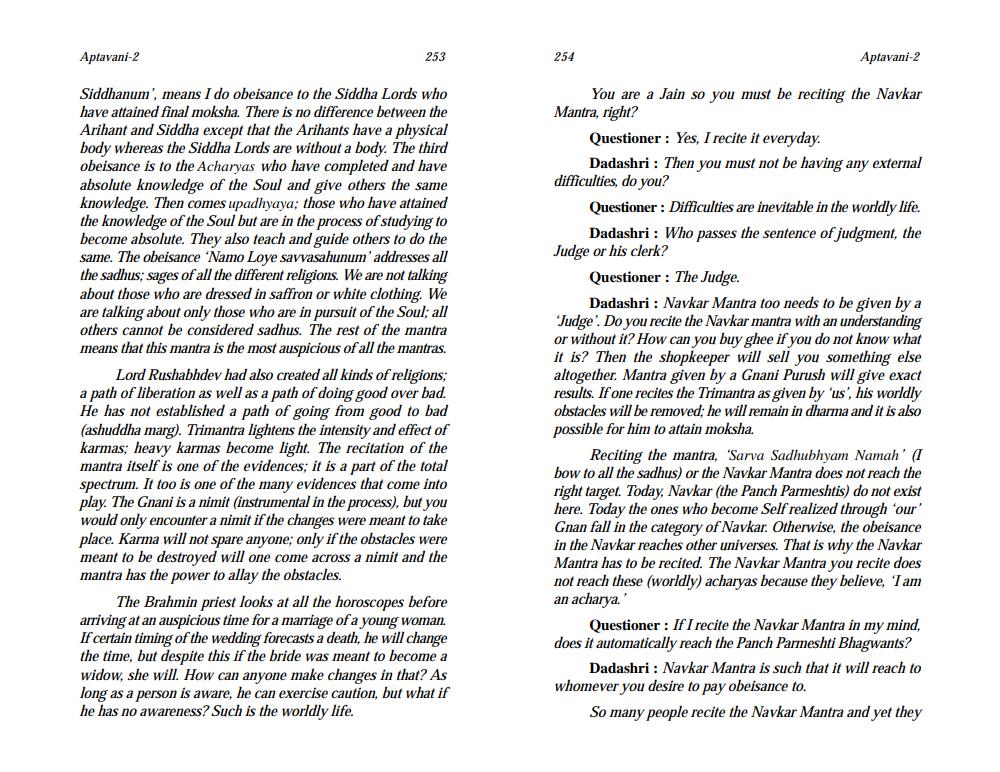________________
Aptavani-2
253
254
Aptavani-2
Siddhanum', means I do obeisance to the Siddha Lords who have attained final moksha. There is no difference between the Arihant and Siddha except that the Arihants have a physical body whereas the Siddha Lords are without a body. The third obeisance is to the Acharyas who have completed and have absolute knowledge of the Soul and give others the same knowledge. Then comes upadhyaya; those who have attained the knowledge of the Soul but are in the process of studying to become absolute. They also teach and guide others to do the same. The obeisance Namo Loye savvasahunum'addresses all the sadhus, sages of all the different religions. We are not talking about those who are dressed in saffron or white clothing. We are talking about only those who are in pursuit of the Soul; all others cannot be considered sadhus. The rest of the mantra means that this mantra is the most auspicious of all the mantras.
Lord Rushabhdev had also created all kinds of religions; a path of liberation as well as a path of doing good over bad. He has not established a path of going from good to bad (ashuddha marg). Trimantra lightens the intensity and effect of karmas; heavy karmas become light. The recitation of the mantra itself is one of the evidences, it is a part of the total spectrum. It too is one of the many evidences that come into play. The Gnani is a nimit (instrumental in the process), but you would only encounter a nimit if the changes were meant to take place. Karma will not spare anyone; only if the obstacles were meant to be destroyed will one come across a nimit and the mantra has the power to allay the obstacles.
The Brahmin priest looks at all the horoscopes before arriving at an auspicious time for a marriage of a young woman. If certain timing of the wedding forecasts a death, he will change the time, but despite this if the bride was meant to become a widow, she will. How can anyone make changes in that? As long as a person is aware, he can exercise caution, but what if he has no awareness? Such is the worldly life.
You are a Jain so you must be reciting the Navkar Mantra, right?
Questioner: Yes, I recite it everyday.
Dadashri : Then you must not be having any external difficulties, do you?
Questioner : Difficulties are inevitable in the worldly life.
Dadashri : Who passes the sentence of judgment, the Judge or his clerk?
Questioner : The Judge.
Dadashri : Navkar Mantra too needs to be given by a Judge'. Do you recite the Navkar mantra with an understanding or without it? How can you buy ghee if you do not know what it is? Then the shopkeeper will sell you something else altogether. Mantra given by a Gnani Purush will give exact results. If one recites the Trimantra as given by 'us', his worldly obstacles will be removed, he will remain in dharma and it is also possible for him to attain moksha.
Reciting the mantra, Sarva Sadhubhyam Namah' (I bow to all the sadhus) or the Navkar Mantra does not reach the right target. Today, Navkar (the Panch Parmeshtis) do not exist here. Today the ones who become Self realized through our Gnan fall in the category of Navkar. Otherwise, the obeisance in the Navkar reaches other universes. That is why the Navkar Mantra has to be recited. The Navkar Mantra you recite does not reach these (worldly) acharyas because they believe, Tam an acharya.'
Questioner : If I recite the Navkar Mantra in my mind, does it automatically reach the Panch Parmeshti Bhagwants?
Dadashri : Navkar Mantra is such that it will reach to whomever you desire to pay obeisance to.
So many people recite the Navkar Mantra and yet they




